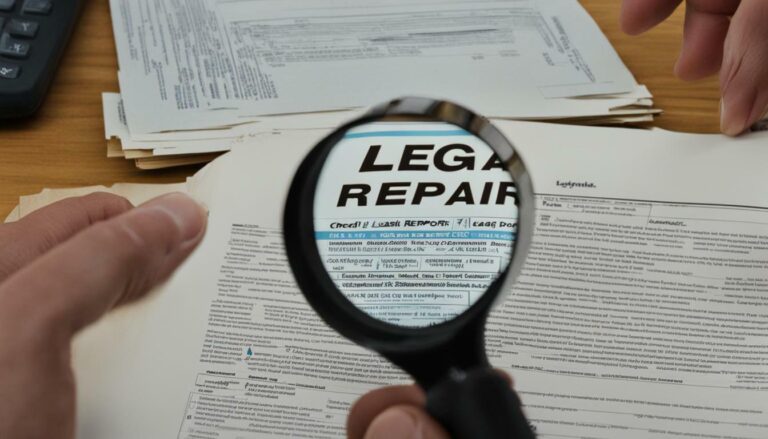Understanding the New Credit Reporting Laws 2023 | Updates & Tips

The year 2023 will witness significant changes in credit reporting laws, impacting both consumers and creditors alike. As these new regulations come into effect, it is crucial to stay informed and adapt to the evolving credit reporting landscape. In this article, we will provide an overview of the new credit reporting laws, explore the need for credit reporting reform, discuss proposed rulemaking to remove medical bills from credit reports, highlight positive changes for borrowers, offer tips for adapting to the new laws, examine the impact on borrowing ability, and outline key considerations for consumers and creditors. Let’s dive into the details.
Key Takeaways:
- Understanding the changes in credit reporting laws is vital for both consumers and creditors in 2023.
- Credit reporting reform is necessary to address issues with credit reports, background checks, and biased dispute systems.
- The Consumer Financial Protection Bureau (CFPB) is working on a proposal to remove medical bills from credit reports, aiming to protect consumers and ensure accurate data usage by creditors.
- New credit reporting laws in 2023 introduce changes such as new scoring models, the positive impact of “Buy Now, Pay Later” offers, and measures to reduce the significance of medical debt on credit.
- Adapting to the new credit reporting laws requires understanding and compliance with the regulations and requirements set for 2023.
- The new credit reporting laws can have an impact on borrowers’ ability to secure loans and creditworthiness assessments from lenders.
- Consumers and creditors need to consider their rights, responsibilities, and stay updated with the evolving credit reporting landscape.
The Need for Credit Reporting Reform
The current credit reporting system, including credit reports, background checks, and tenant screening reports, has raised concerns due to its errors, inclusion of harmful information, and biased dispute systems. This has resulted in a growing demand for credit reporting reform to address these issues and ensure fair and accurate reporting.
Errors in credit reports can lead to significant consequences for individuals, such as being denied credit or facing higher interest rates. These errors can arise from various factors, including outdated or incorrect information, identity theft, and data entry mistakes. The inclusion of harmful information, such as medical debts or non-financial related delinquencies, further exacerbates the negative impact on creditworthiness.
In addition, biased dispute systems have been a cause for concern. Consumers often face challenges when disputing errors on their credit reports, with a lack of transparency and difficulty in navigating the dispute resolution process. This can result in prolonged disputes and hinder individuals from rectifying inaccuracies in their credit profiles.
Recognizing the need for reform, the administrative authority of the Consumer Financial Protection Bureau (CFPB) and legislation passed by Congress play crucial roles in addressing these issues. The CFPB has initiated a rulemaking process aimed at removing medical bills from consumer credit reports, which can alleviate the burden faced by families recovering from medical crises. This proposal also seeks to prohibit creditors from using medical collections information and prevent debt collectors from pressuring consumers based solely on credit reports.
🚨 TUIC Errors + Low Credit Score?
CreditScoreIQ helps you build credit faster by reporting utility bills to all 3 bureaus—while you dispute errors.
Start Building Credit Today →| Issues in Credit Reporting | Proposed Reforms |
|---|---|
| Errors in credit reports | Improved data accuracy and timely dispute resolution mechanisms |
| Inclusion of harmful information | Removal of medical debts from consumer reports and restrictions on using medical collections information |
| Biased dispute systems | Increase transparency and simplify the dispute resolution process |
“Credit reporting reform is essential to ensure a fair and accurate system that promotes transparency and protects consumer rights. By addressing the errors, harmful information, and biased dispute systems prevalent in the current credit reporting landscape, we can create a more equitable and reliable credit reporting system for all.”
Proposed Rulemaking: Removing Medical Bills from Credit Reports
Recognizing the financial burden of medical bills, the Consumer Financial Protection Bureau (CFPB) has commenced a rulemaking process to remove medical debts from Americans’ credit reports. This proposal aims to assist families in recovering from medical crises and curtail coercive collection practices, while ensuring the accurate usage of data by creditors.
The CFPB is considering various measures to achieve these objectives. One potential reform is removing medical debts from consumer reports, which would prevent these bills from negatively impacting individuals’ creditworthiness. By prohibiting creditors from using medical collections information, the proposal seeks to ensure that consumers are not penalized for medical debt beyond their control.
Moreover, the proposed rulemaking aims to stop debt collectors from pressuring consumers based on their credit reports. This measure would provide relief to individuals facing financial challenges due to medical bills, as they would no longer be subjected to harassment or coercion by debt collectors.
Overall, the proposed rulemaking by the CFPB to remove medical bills from credit reports is a significant step towards creating a fairer credit reporting system. By alleviating the burden of medical debt and protecting consumers from coercive collection practices, this proposal strives to promote financial well-being and ensure the accurate representation of individuals’ creditworthiness.
Positive Changes in Credit Reporting for Borrowers in 2023
As we embark on the new year, 2023 brings with it significant changes in credit reporting that can have a positive influence on borrowers’ financial prospects. Let’s explore five key changes that can impact your creditworthiness and enhance your borrowing ability.
New Scoring Models
One of the notable improvements in credit reporting is the introduction of new scoring models. These models will take into account recent payment history, giving more weight to your most up-to-date financial behavior. This means that even if you’ve had past credit difficulties, your recent responsible payments can help boost your credit score, making you a more attractive borrower.
“Buy Now, Pay Later” Offers
In the evolving landscape of credit reporting, “Buy Now, Pay Later” (BNPL) offers have gained popularity. These options allow you to make purchases and spread the payments over time with little or no interest. The positive aspect is that BNPL transactions are often reported to credit bureaus, which can reflect favorably on your credit report, showcasing your ability to manage credit responsibly.
Lessened Importance of Medical Debt
Medical debt has long been a thorny issue impacting creditworthiness. However, the changes in credit reporting for 2023 will lessen the significance of medical debt on your credit report. This means that a past medical bill won’t have the same negative impact on your credit score as it did before, giving you a better chance at securing favorable loan terms.
Reporting On-Time Rent Payments
Renting a home has become an essential part of many people’s lives, and now it can positively contribute to your credit history. With the new credit reporting changes, on-time rent payments can be reported, potentially boosting your credit score. This recognition of your responsible rental behavior highlights your financial reliability and expands your borrowing options.
These positive changes in credit reporting for borrowers in 2023 open up new opportunities for you to improve your creditworthiness. By understanding and leveraging these enhancements, you can enhance your financial prospects and secure better loan terms.
Tips for Adapting to the New Credit Reporting Laws
Adapting to the new credit reporting laws is crucial to ensure compliance and maintain a positive credit standing. With the upcoming changes in credit reporting regulations in 2023, it’s important to stay informed and take the necessary steps to adapt to these new requirements.
Here are some key tips to help you navigate the new credit reporting landscape:
- Stay updated: Regularly check for updates and guidelines issued by regulatory authorities regarding the new credit reporting laws. Being aware of any changes will help you adjust your credit reporting practices accordingly. Stay informed about the latest developments in credit reporting regulations in 2023 to ensure compliance.
- Review reporting processes: Take the time to review your current credit reporting processes to ensure they align with the new regulations. Pay attention to any specific requirements or changes related to reporting timelines, data accuracy, and consumer rights. Implement necessary adjustments to your reporting procedures to avoid any compliance issues.
- Educate your team: It’s essential to educate your team members about the new credit reporting laws. Provide training sessions or information updates to ensure everyone understands their roles and responsibilities in complying with the regulations. This will help minimize errors and ensure consistent adherence to the new requirements across your organization.
- Monitor credit reports: Regularly review credit reports to ensure accuracy and address any discrepancies promptly. Keep track of changes in credit reporting practices and industry guidelines to ensure that your organization stays ahead of the curve. Monitor any updates related to credit reporting regulations in 2023 so that you can promptly implement any necessary changes.
By adapting to the new credit reporting laws, you can maintain compliance, protect consumer rights, and uphold the integrity of your credit reporting practices. Stay informed, review your processes, educate your team, and monitor credit reports to ensure a smooth transition and continued compliance with the evolving credit reporting regulations in 2023.
| Key Tips for Adapting to the New Credit Reporting Laws |
|---|
| Stay updated |
| Review reporting processes |
| Educate your team |
| Monitor credit reports |
The Impact of New Credit Reporting Laws on Borrowing Ability
The new credit reporting laws may have a significant impact on borrowers’ ability to secure loans and their overall creditworthiness. These changes in credit reporting, which are set to take effect in 2023, aim to provide a more accurate representation of a person’s credit history and financial standing. Lenders will need to adjust their creditworthiness assessments to align with the updated reporting regulations, potentially influencing loan applications.
One major change in credit reporting is the introduction of new scoring models that consider recent payment history. This means that borrowers with a consistent record of timely payments will have a higher credit score, making them more attractive to lenders. On the other hand, those who have a history of late or missed payments may see a decrease in their credit score, making it more challenging to secure loans or obtain favorable borrowing terms.
Additionally, credit bureaus are taking measures to lessen the impact of medical debt on credit reports. Medical bills are often a significant contributor to credit issues, as they can be unexpected and burdensome. By reducing the significance of medical debt, lenders may give more weight to other factors when evaluating an individual’s creditworthiness, increasing the borrowing opportunities for those with medical debts.
Furthermore, the ability to report on-time rent payments can now positively impact credit scores. Rent is a significant expense for many individuals, and timely payments demonstrate financial responsibility. With the new credit reporting laws, individuals who consistently pay their rent on time can potentially boost their credit scores, improving their borrowing ability in the future.
| New Credit Reporting Changes | Impact on Borrowing Ability |
|---|---|
| New scoring models considering recent payment history | Potential increase or decrease in credit scores |
| Lessening the importance of medical debt on credit reports | Potential increase in borrowing opportunities |
| Ability to report on-time rent payments | Potential credit score improvement |
It’s important for borrowers to be aware of these changes and the potential impact on their borrowing ability. Understanding the new credit reporting laws and taking steps to maintain a positive credit history will be crucial in ensuring financial stability and access to loans.
Key Considerations for Borrowers:
- Pay bills on time to maintain a positive payment history.
- Minimize medical debt by exploring payment options and negotiating with healthcare providers.
- Keep track of rent payments and ensure they are reported to credit bureaus.
- Regularly review credit reports for errors or inaccurate information.
- Seek professional advice if facing financial challenges or struggling with debt.
By understanding the impact of the new credit reporting laws and implementing positive financial habits, borrowers can navigate the changing landscape and enhance their borrowing ability in the future.
Key Considerations for Consumers and Creditors
Understanding the new credit reporting laws is essential for both consumers and creditors to protect consumer rights and ensure compliance with evolving regulations. As a consumer, it is crucial to be aware of your rights and the information that can be included in your credit report. By staying informed, you can take proactive steps to dispute any errors or harmful information that may impact your creditworthiness.
On the other hand, as a creditor, being knowledgeable about the new credit reporting laws is vital to fulfill your responsibilities and avoid potential legal issues. You must stay updated with the regulatory updates and ensure that your credit reporting practices align with the latest requirements. This includes following proper procedures to obtain and report accurate information and refraining from using coercive collection practices.
To help you navigate the changing landscape of credit reporting, consider the following key considerations:
- Stay informed: Regularly check for updates on the new credit reporting laws and regulations. This will enable you to understand any changes that may impact your rights or responsibilities as a consumer or creditor.
- Review your credit report: Periodically review your credit report to ensure accuracy and identify any potential discrepancies or harmful information. If you come across any errors, take prompt action to dispute and resolve them.
- Seek assistance when needed: If you encounter difficulties understanding or complying with the new credit reporting laws, consider seeking professional advice from credit counseling services or legal experts specializing in consumer rights and credit reporting.
- Protect your personal information: Be cautious of sharing sensitive personal information and ensure that you only provide it to reputable and trustworthy sources. Safeguarding your data can help prevent identity theft or unauthorized access to your credit report.
By taking these key considerations into account, both consumers and creditors can navigate the new credit reporting laws effectively, ensuring consumer protection and compliance with regulatory requirements. It is essential to stay proactive and informed to maintain a healthy credit history and protect your financial well-being.
| Consumer Rights | Creditor Responsibilities |
|---|---|
| Understanding your rights to dispute incorrect information on your credit report. | Ensuring the accurate reporting of consumer credit information. |
| Knowing the time limits for negative information to stay on your credit report. | Obtaining and verifying accurate information about consumers before reporting it. |
| Being aware of your right to receive a free credit report annually. | Complying with consumer protection laws and regulations pertaining to credit reporting. |
Conclusion
The new credit reporting laws of 2023 signify a significant shift in the credit reporting landscape, necessitating understanding, adaptation, and compliance to promote better financial outcomes for consumers and creditors alike.
As discussed earlier, the need for credit reporting reform has become evident due to the problems associated with credit reports, background checks, and tenant screening reports. Errors, harmful information, and biased dispute systems have plagued the credit reporting industry, highlighting the urgency for change. Reforms can be achieved through the administrative authority of the Consumer Financial Protection Bureau (CFPB) or through legislation passed by Congress, addressing these issues and ensuring fair and accurate credit reporting.
One notable proposal by the CFPB is the removal of medical bills from credit reports. This initiative aims to provide relief to families facing medical crises, prevent coercive collection practices, and ensure the accurate usage of data by creditors. Measures such as eliminating medical debts from consumer reports, prohibiting creditors from using medical collections information, and preventing debt collectors from pressuring consumers based on credit reports can positively impact individuals and promote financial stability.
Furthermore, borrowers can expect positive changes in credit reporting practices in 2023. New scoring models that consider recent payment history will provide a more comprehensive assessment of creditworthiness. The inclusion of “Buy Now, Pay Later” offers on credit reports can also contribute to a borrower’s credit profile. Additionally, credit bureaus are taking steps to reduce the significance of medical debt on credit, while the ability to report on-time rent payments can boost credit scores, further expanding opportunities for borrowers.
It is crucial for consumers and creditors to stay informed and adapt to the new credit reporting laws. Understanding the requirements and compliance measures in place can help individuals and businesses navigate the changing landscape. By keeping up with the updates and adhering to the regulations, both consumers and creditors can ensure a fair and accurate credit reporting system, enhancing financial well-being for all.
FAQ
What are the key updates in the new credit reporting laws for 2023?
The new credit reporting laws for 2023 bring several key updates, including changes to scoring models, the treatment of medical debt, and the ability to report on-time rent payments. These updates aim to provide a more accurate representation of creditworthiness for borrowers.
How can I stay compliant with the new credit reporting laws?
To stay compliant with the new credit reporting laws, it is important to stay informed about the changes and understand the requirements. Regularly monitor your credit reports, ensure accuracy of information, and familiarize yourself with the guidelines provided by the Consumer Financial Protection Bureau (CFPB).
Will the new credit reporting laws impact my borrowing ability?
The new credit reporting laws can have an impact on your borrowing ability. The changes in credit reporting, such as new scoring models and considerations for positive payment history, can potentially improve creditworthiness assessments and increase your chances of securing loans.
How will the new credit reporting laws affect creditors?
The new credit reporting laws place responsibility on creditors to ensure compliance with the regulations. Creditors should be aware of the changes, adapt their processes accordingly, and stay updated with any regulatory updates to ensure they are using accurate and fair data in their credit assessments.
What steps can I take to adapt to the new credit reporting laws?
To adapt to the new credit reporting laws, consider reviewing your credit reports regularly, paying bills on time, and exploring options to report positive payment history, such as on-time rent payments. It is also important to educate yourself about your rights as a consumer and understand the dispute resolution processes available to you.
Source Links
- https://www.consumerfinance.gov/about-us/newsroom/cfpb-kicks-off-rulemaking-to-remove-medical-bills-from-credit-reports/
- https://www.nclc.org/resources/2023-credit-consumer-reporting-priorities-to-promote-economic-stability/
- https://www.mynchomes.com/blog/changes-to-credit-reporting-and-what-it-means-for-2023-buyers.html
Ready to Improve Your Credit?
Disputing TUIC errors is step one. Step two? Boost your score by reporting utility payments with CreditScoreIQ.
Get Started Now (Only $1 Trial) →3-bureau reporting • $1M identity insurance • Dark web monitoring




